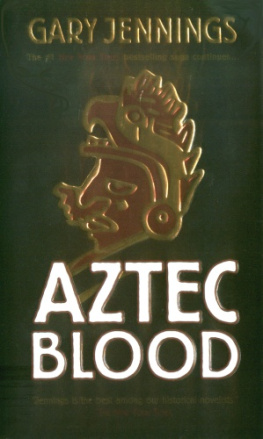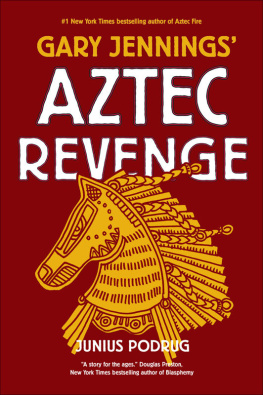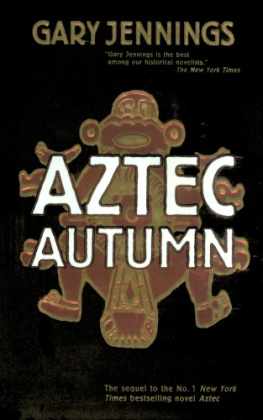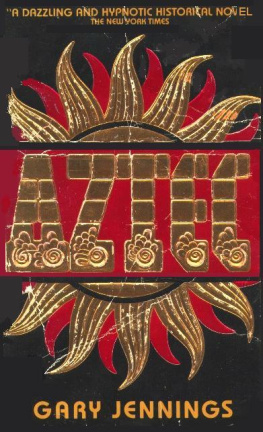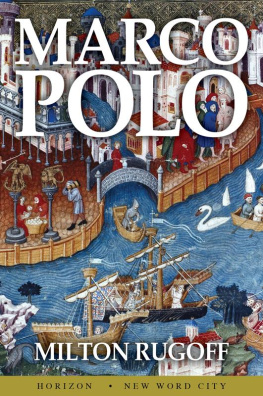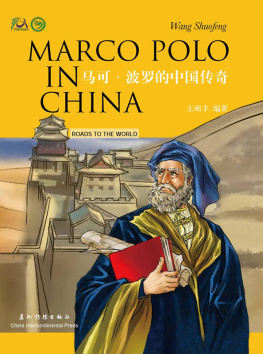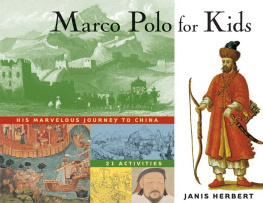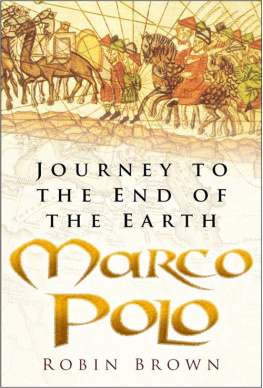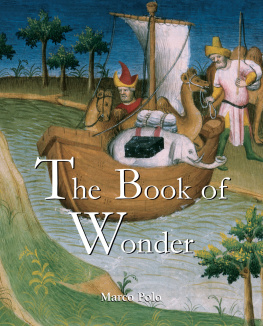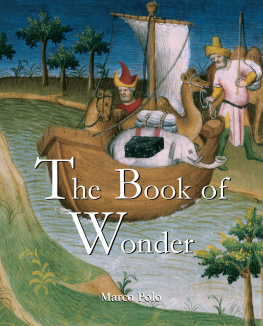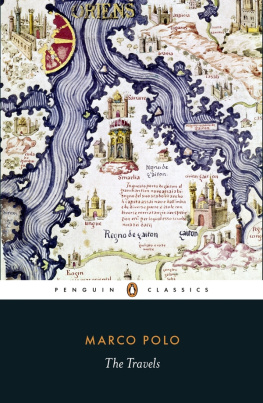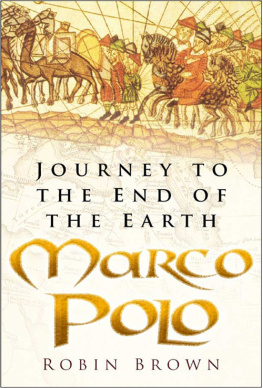
When Marco Polo lay on his deathbed,
his priest, his friends and relations
clustered around him to plead that he
at last renounce the countless lies he
had related as his true adventures, so his
soul would go cleansed to Heaven. The
old man raised up, roundly damned them
all and declared, I have not told
the half of what I saw and did!
ACCORDING TO
FRA JACOPO DACQUI,
MARCO POLOS CONTEMPORARY
AND HIS FIRST BIOGRAPHER
Come hither, great princes! Come hither, emperors and kings, dukes and marquises, knights and burgesses! Come hither, you people of all degrees, who wish to see the many faces of mankind and to know the diversities of the whole world! Take up this book and read it, or have it read to you. For herein you will find all the greatest wonders and most marvelous curiosities .
AH, LUIGI, LUIGI! In the worn and wrinkled fustian of those old pages I hear your very voice again.
It had been many years since I last looked into our book, but when your letter came I fetched it out once more. I can still smile at it and admire it simultaneously. The admiration is for its having made me famous, however little I may deserve that fame, and the smile is for its having made me notorious. Now you say that you wish to write another work, an epic poem this time, again incorporating the adventures of Marco Poloif I will grant that libertybut attributing them to an invented protagonist.
I cast back in my memory to our first meeting, in the cellars of that Genoa palazzo where we prisoners of war were lodged. I remember how diffidently you approached me, and with what reticence you spoke:
Messer Marco, I am Luigi Rustichello, late of Pisa, and I have been a captive here since long before you arrived. I have listened to you telling that hilariously ribald story of the Hindu with his ahem caught in the holy rock hole. I have heard you tell it three times now. Once to your fellow prisoners, again to the warder, and yet again to the visiting almoner of the Brotherhood of Justice.
I inquired, Are you weary of hearing it, Messere?
And you said, Not at all, Messere, but you will soon be weary of the telling. Many more persons will want to hear that tale, and all the other tales you have told, and any others which perhaps you have not told yet. Before you tire of the telling, or of the stories themselves, why do you not simply tell to me all your recollections of your travels and adventures? Tell them only the once and let me set them down on paper. I am a writer of some facility and much experience. Your tales could make a considerable book, Messer Marco, and multitudes of people then can read it for themselves.
And so I did, and so you did, and so the multitudes have done. Though many other journeyers before me had written of their travels, none of those works ever enjoyed the immediate and continuing popularity of our Description of the World. Perhaps, Luigi, it was because you chose to transcribe my words in French, the most widely known Western language. Or perhaps you made my stories better in the writing than I could do in the telling. At any rate, somewhat to my surprise, our book became much read and talked of and sought after. It was copied and recopied, and by now has been translated into every other language of Christendom, and of those versions, too, countless copies have been taken and circulated.
But none of them tells the singular story of the anguished Hindu and his rape of a rock.
When I sat in that clammy Genoa prison, recounting my reminiscences, and you sat putting them into proper words, we decided that they would be told in only the most proper words. You had your reputation to consider, and I had my family name. You were the Rustichello of Pisa, and I was a Polo of Venice. You were the romancier courtois, already known for your retellings of the classic tales of chivalryof Tristan and Isolde, of Lancelot and Ginevra, of Amys and Amyllion. I was, as you described me in the book, representative of the sajes et nobles citaiens de Venece. So we agreed that our pages would contain only those of my adventures and observations which we could publish without a blush or a qualm, and which could be read without offending the Christian sensibilities even of maiden ladies or nuns.
Further, we determined to leave out of the book anything which might strain the credence of any stay-at-home reader. I recall that we even debated before we included my encounters with the stone that burns and the fabric that will not. Thus many of the most marvelous incidents of my travels were, so to speak, abandoned by the wayside of my wanderings. We left out the unbelievable and the bawdy and the scandalous. But now, you tell me, you want to mend those gapsthough still without hazarding my good name.
So your new protagonist will be called Monsieur Bauduin, not Messer Marco, and he will hail from Cherbourg, not Venice. But in all else he will be me. He will experience, enjoy, endure all that I didand all that I left untold heretoforeif I will refresh your memory by telling those many stories to you again.
It is a great temptation, certainly. It would be like living those days anewand those nightsand that is a thing I have long yearned to do. I always intended, you know, to journey again to the far eastward. But no, you could not have known. I have not spoken of that even in my family circle. It has been a dream I treasured too much to share .
Yes, I meant to go again sometime. But when I was freed from Genoa and returned to Venice, the family business demanded my attention, and so I hesitated to depart. And then I met Donata, and she became my wife. So I hesitated again a while, and then there was a daughter. Naturally that gave me cause to hesitate, and there came a second daughter, and then there were three. So, for one reason and another, I kept on hesitating, and suddenly one day I was old.
Old! It is inconceivable! When I look into our book, Luigi, I see myself there a boy, and then a youth, and then in my manhood, and even at the books very end I am still a stalwart. But when I look into a glass, I see there an aged stranger, sapped and sagged and blemished and enfeebled by the corroding rusts of five and sixty years. I murmur, That old man cannot go again a-journeying, and then I realize: that old man is Marco Polo.
So your letter came to me at a vulnerable moment. And your suggestion that I contribute to a new book is an opportunity I will not let pass. If I cannot do again the things I once did, at the least I can remember them and take relish in them while I relate them, since I can now do that with the impunity of your Bauduin disguise. You may wonder at my so welcoming that disguise, as you may also have wondered at my remark that the earlier book earned me both undeserved renown and undeserved notoriety. I shall explain.
I never claimed to have been the first man to travel from the West into the far East, and you did not put any such boast into our book. Nevertheless, that seems to have been the impression produced upon most of its readersor those readers living elsewhere than Venice, where no such illusion obtains. After all, my own Venetian father and uncle had gone to and returned from the East before they retraced their journey and that time took me with them. Also, in the East itself I met many other Westerners, of all nations from England to Hungary, who had arrived there before me, and some of whom stayed there longer than I did.
Next page

